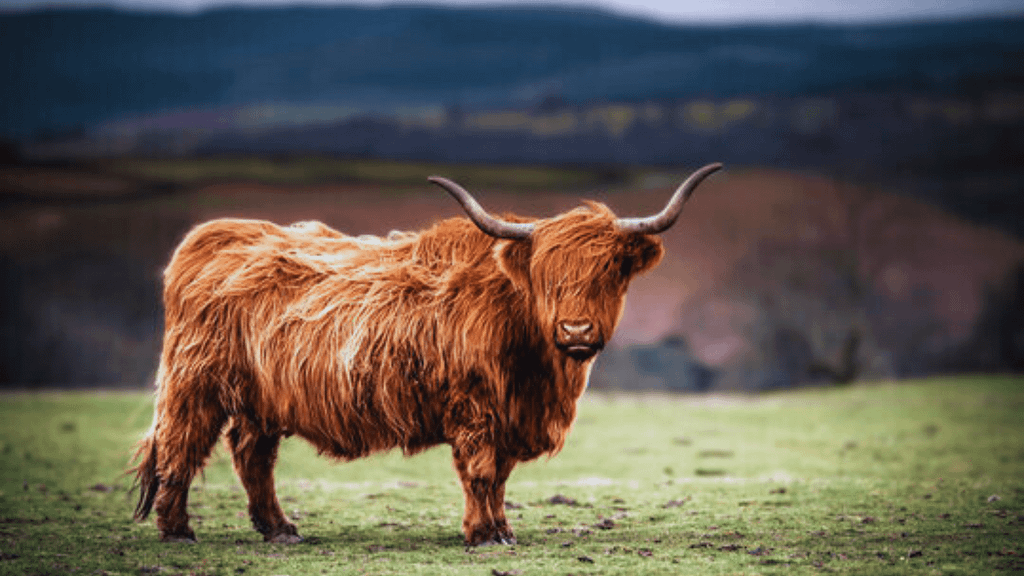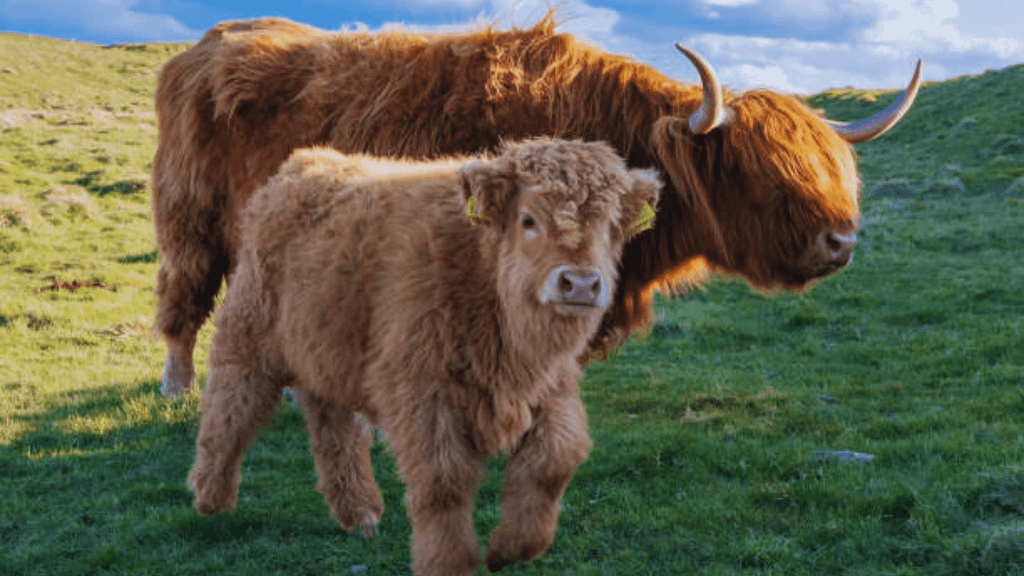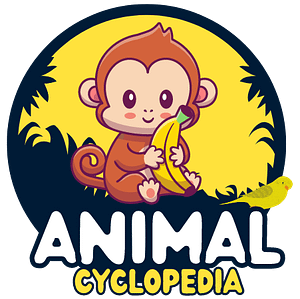Are you Curious about the Mini Highland Cows? Do You Want To Know their lifespan, size, weight, and price? Okay, we will cover everything for you in this complete guide to Mini Highland Cows in 2024.
You’ll find everything you need to know. If you’re a prospective owner, a curious lover, or simply desiring information on these lovely Cow breeds, rest assured that you’ve come to the right place.
Mini Highland Cows, also called Miniature Highland Cattle, are like pint-sized versions of the regular Scottish Highland Cattle breed. They’re super cute and smaller than the usual ones you see.
These small cows have the same unique long hair and impressive appearance as the bigger ones, but they’re purposely bred to be small.
Mini Highland Cows usually reach about 36 to 42 inches in height at the shoulder, making them perfect for small farms, hobby farms, or pets.
Despite their small size, they retain many characteristics that have made Highland Cattle popular, such as their hardiness, adaptability to various climates, and gentle temperament.
This article is a complete guide to Mini Highland Cows in 2024, covering important aspects like their lifespan, size, weight, and price. It’s aimed at both potential owners and curious fans.
When you read about these important things, you’ll know how to care for these adorable animals, whether on a farm or kept as pets. The guide will also give you easy tips on buying, housing, feeding, and looking after Mini Highland Cows to ensure you do a great job caring for them.
If you’re considering adding Miniature Highland Cows to your farm or want to know more about them, this article covers all things Mini Highland Cow-related in 2024.
Brief History of Mini Highland Cow
The Mini Highland Cow, also called Miniature Highland Cattle, originated in Scotland, where the larger Highland Cattle have been renowned for their resilience in harsh environments for centuries. Miniature Highland Cows were bred to create smaller versions of these unique cows, often due to space constraints or a desire for easier-to-handle livestock.
People started trying to breed smaller Highland Cattle, and over time, they created the Miniature Highland Cows as its type of cow. Breeders worked hard to keep the special traits of the Highland breed but make them smaller. Mini Highland Cows are loved not just because they’re small but also because they look cute and are friendly.
Mini Highland Cows are important in farming and as pets because they have special qualities that make them useful in both roles.
Even though they’re smaller, mini Highland cows are handy in farming. They still have many of the good traits that regular Highland Cattle have. They’re great at eating grass in rough places and can live in different kinds of weather, perfect for small farms or areas with little room.
Plus, they’re calm and easy to handle, so they’re good for new farmers or people who don’t want animals that need much care.
As pets, Miniature Highland Cows are awesome for people who like having unique and cute animals around. Since they’re small, they can fit in small spaces like small pieces of land or even in neighbourhoods where big farm animals aren’t allowed. Mini Highland Cows are friendly and can get close to the
Read Also: Red Sindhi Cow Price, Daily Milk Yield, Life Span, Feed, and Taking Care
Mini Highland Cow Physical Characteristics

Mini Highland Cows have a long, messy hair that helps them stay cosy in Scotland’s chilly weather. Their hair comes in different colours and feels rough, keeping them warm and dry. They also have cool curved horns that point backwards from their heads. These horns are handy for protecting themselves and showing who’s boss in their group.
| Silver, yellow | Mini Highland Cow | Standard Highland Cow |
|---|---|---|
| Colour Variations and Patterns | 36 to 42 inches | 48 to 54 inches |
| Weight | 400 to 800 pounds | 900 to 1,800 pounds |
| Distinctive Features | Long, shaggy hair | Long, shaggy hair |
| Curved horns | Curved horns | |
| Majestic appearance | Majestic appearance | |
| Color Variations and Patterns | Black, red, dun, brindle, | Black, red, dun, brindle, |
| Silver, yellow | Multiple patterns (belted, | |
| Various patterns (belted, | Various patterns (belted, | |
| speckled, roan) | speckled, roan) |
Mini Highland Cows are much tinier than regular Highland Cows. Regular ones can be about 4 to 4.5 feet tall and weigh up to a ton. But Miniature Highland Cows are way smaller. They are only around 3 to 3.5 feet tall and weigh between 400 to 800 pounds. This smaller size makes them easier to deal with, particularly for smaller farms or homes with little room.
Mini Highland Cows come in many colours and designs, making them even more interesting. You might often see them in black, red, or blue colours, but they can also be brindle, silver, or even yellow. Some are just one solid colour, while others have cool patterns like belts, spots, or various colours. All these variations make each Miniature Highland Cows look special and one-of-a-kind.
Mini Highland Cow Temperament and Behavior
Mini Highland Cows are famous for being calm and friendly, perfect for new and seasoned cattle owners. Even though they look strong, they’re usually relaxed and easy to manage. They’re naturally curious and often enjoy being around people. This gentle behaviour makes them great as pets or companions.
Miniature Highland Cows are impressive because they can handle various weather and places. They come from the tough lands of the Scottish Highlands, where it’s cold and windy, and the food is only sometimes plentiful. But they’ve learned to do well in these conditions. That means they can live happily in many places, from mountains to plains by the sea.
Mini Highland Cows are friendly and enjoy being around people and other animals. They often get attached to the people caring for them and like to show affection by nudging and seeking attention.
They’re also usually friendly towards other animals, like other cows, or even smaller pets like dogs and cats. Because of their peaceful nature and ability to get along with different creatures, they’re great for farms or homes with many other animals.
Read More: Sahiwal Cow Price, Milk Per Day, Food, Adaptability, Dimension And Origin
Benefits of Mini Highland Cow
Mini Highland Cows are liked because they’re easy to take care of. Farmers and people with homes in the countryside like them because they’re strong and can live in many different areas without much attention.
They’re good at finding food by grazing on grass and other plants, so you don’t have to give them much extra food. Their long, shaggy hair keeps them warm in cold weather, so they don’t need a fancy shelter or additional protection.
Mini Highland Cows are good at finding food by eating grass and plants. Because they’re not too big, they can go to places where bigger animals can’t, like rough ground or tight spaces.
Miniature Highland Cows are good at making the most of their surroundings. They can turn grass and plants into tasty meat and milk well. Because they’re so good at finding their food, it saves money on feeding them. And it’s good for the land because they help keep it healthy.
Despite their smaller size, Mini Highland Cows possess dual-purpose capabilities, making them valuable assets for meat and milk production. While they may yield less meat or milk than larger breeds, Miniature Highland Cows still produce flavorful beef and rich, creamy milk.
Their meat is prized for its tenderness and marbling, while their milk is renowned for its high butterfat content, which is ideal for making cheese, butter, and other dairy products. This versatility allows Mini Highland Cows to contribute to meat and dairy production systems, providing farmers with multiple income streams and consumers with high-quality, locally sourced products.
Care and Management of Mini Highland Cow
Keeping Mini Highland Cows safe and comfortable requires good shelter and strong fences. Even though they’re tough, they still need protection from bad weather, such as heavy rain, extreme heat, or cold.
Like a shed with three sides, a solid shelter can keep them safe when the weather gets rough. Strong fences made of sturdy materials like wood or metal with special wire or electric fencing can keep them from getting out and protect them from animals that might hurt them.
Mini Highland Cows don’t need as much food as bigger cows, but they still need a good mix to stay healthy. They mostly eat grass in the pasture and hay when there’s not enough grass.
It’s important to ensure they always have clean water to drink. Even though they’re good at finding their food, it’s still smart to monitor them and give them more or less food if they need it to stay healthy and avoid eating too much grass.
Like other animals, mini Highland cows sometimes get sick, so looking out for certain problems is important. They might get worms inside them or ticks on their skin, but you can keep these under control by giving them medicine regularly.
It’s also important to watch for signs of breathing problems, foot issues, or not getting the right food. If you have a good vet who knows about cows, they can help you care for them and catch any problems early to keep them healthy.
You May Like: Jersey Cow Price, Milk Per Day, images, Food, Adaptability, Dimension, And Origin
Mini Highland Cow Breeding and Reproduction

Keeping Mini Highland Cows safe and comfortable requires good shelter and strong fences. Even though they’re tough, they still need protection from bad weather, such as heavy rain, extreme heat, or cold.
Like a shed with three sides, a solid shelter can keep them safe when the weather gets rough. Strong fences made of sturdy materials like wood or metal with special wire or electric fencing can keep them from getting out and protect them from animals that might hurt them.
Mini Highland Cows don’t need as much food as bigger cows, but they still need a good mix to stay healthy. They mostly eat grass in the pasture and hay when there’s not enough grass.
It’s important to ensure they always have clean water to drink. Even though they’re good at finding their food, it’s still smart to monitor them and give them more or less food if they need it to stay healthy and avoid eating too much grass.
Like other animals, mini Highland cows sometimes get sick, so looking out for certain problems is important. They might get worms inside them or ticks on their skin, but you can keep these under control by giving them medicine regularly.
It’s also important to watch for signs of breathing problems, foot issues, or not getting the right food. If you have a good vet who knows about cows, they can help you care for them and catch any problems early to keep them healthy.
Related Article: Gir Cow Price, Milk Per Day, Images, Food, Adaptability, And Dimensions
Mini Highland Cow Breeding and Reproduction
Rules about keeping Mini-Highland Cows can be different depending on where you live. Some places have specific rules about keeping animals, like Mini-Highland Cows, and they might say how many you can have and where they can stay on your property. It’s important to check and follow these rules to avoid problems with neighbours or the law.
People who breed Mini Highland Cows can get them registered and certified through special groups that keep track of their family trees and breeding history. These groups set rules about what makes a good Miniature Highland Cows, like their appearance and genes.
If a cow meets these rules, the breeder can register it. Sometimes, the breeder has to show papers proving the cow’s family and maybe even do genetic tests. This helps ensure that registered Mini Highland Cows are of top quality.
Rules for bringing Miniature Highland Cows into or out of a country can differ depending on the countries involved. Governments usually have rules to ensure diseases don’t spread and that animals are treated well. If you want to bring Mini Highland Cows into a country, you might need special papers and health checks to keep them in quarantine.
Likewise, when sending Mini Highland Cows to another country, it’s crucial to adhere to the regulations of that country. These rules could involve health examinations, paperwork, and ensuring safe transportation. Understanding and complying with these regulations is essential for Miniature Highland Cows’ lawful and secure trading.
Mini Highland Cow Price and Cost
As Milestone Family Firms says, miniature Highlander Cattle can cost anywhere from $1000 to $21,000. This big range in price is probably due to factors like their age, whether they’re boys or girls, their family history, how they look, and how good they are.
If you’re considering buying one, looking closely at the listings and asking about the Miniature Highlander Cattle you want is important. This way, you can find out exactly how much it costs and whether it’s right for you.
Mini Highland Cow Care Tips
Shelter: Build a strong shelter like a barn or a shed with three sides to protect animals from bad weather like heavy rain, strong winds, and very hot or cold temperatures.
Fencing: Make sure the fence around the area where the animals are kept is sturdy. You can use things like wood or metal to make a fence, and you can also add wire or electric fencing to stop the animals from getting out and to keep them safe from other animals that might hurt them.
Nutrition: Let the animals eat grass from the pasture, and give them hay if needed to stay healthy. Make sure they always have clean, fresh water available.
Health Monitoring: Check on the animals regularly to see if they seem sick or injured. If necessary, give them deworming and treatments for parasites. If you notice any health problems, get help from a vet as soon as possible.
Socialization: Mini Highland Cows are social animals and enjoy the company of humans and other animals. Provide opportunities for interaction and socialization to promote their well-being and mental stimulation.
Regular Maintenance: Keep their living area clean and well-maintained, removing any hazards or obstacles that could cause injury. Trim their hooves regularly and provide necessary grooming to keep their coats healthy.
Conclusion
The Mini Highland Cow stands out as a captivating and adaptable breed that has won the admiration of enthusiasts and farmers alike. Throughout this detailed guide, we’ve covered key aspects of Miniature Highland cow ownership in 2024, from their lifespan, size, weight, and price to their care requirements.
From their endearing appearance to their gentle nature and practical usefulness, Mini Highland Cows offer a unique blend of charm and utility. Whether you’re considering integrating them into your farm or are intrigued by these pint-sized bovines, this guide has provided valuable insights into their characteristics and management.
We’ve explored the origins of the Mini Highland Cow breed and delved into its physical traits, temperament, and behaviours. Additionally, we’ve highlighted its agricultural and pet-related benefits, showcasing its adaptability, grazing efficiency, and dual-purpose role in meat and milk production.
Understanding how to properly care for and manage Mini Highland Cows is essential for ensuring their health and happiness. From considerations around housing and feeding to addressing health issues and breeding practices, this guide has offered practical advice for prospective owners and caretakers.
We touched on the legal aspects and regulations governing Mini Highland Cow ownership, encompassing zoning laws, registration procedures, and import/export protocols. Adhering to these legal obligations is paramount for responsible ownership and trade of Miniature Highland Cows.
We’ve discussed the pricing and financial aspects of Mini Highland Cows, underscoring the diverse range of prices and factors influencing the buying and selling process.
The Mini Highland Cow remains a cherished and valuable breed in contemporary agriculture and animal husbandry. As custodians of these remarkable creatures, it’s crucial to recognize their importance and ensure their continued welfare and prosperity for generations ahead. Whether serving as a sustainable food source or beloved companions, Mini Highland Cows hold a special place in our hearts and on our farms in 2024 and beyond.









